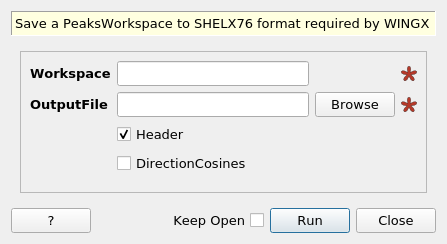\(\renewcommand\AA{\unicode{x212B}}\)
SaveHKLCW v1¶

SaveHKLCW dialog.¶
Summary¶
Save a PeaksWorkspace to SHELX76 format required by WINGX
See Also¶
Properties¶
Name |
Direction |
Type |
Default |
Description |
|---|---|---|---|---|
Workspace |
Input |
IPeaksWorkspace |
Mandatory |
PeaksWorkspace to be saved |
OutputFile |
Input |
string |
Mandatory |
Output File. Allowed values: [‘hkl’, ‘int’] |
Header |
Input |
boolean |
True |
If to include the header in the output |
DirectionCosines |
Input |
boolean |
False |
If to include the direction cosines output |
Description¶
Input¶
This algorithm will save a peaks workspace to a SHELX76 formatted file which is made to be compatible with Fullprof and WINGX. This is a simplified version compared to SaveHKL v1 and it assumes a constant wavelength. It also assume integer HKL and will round to the nearest integer value.
For output with direction cosines the format is.
h |
k |
l |
F^2 |
sigma(F^2) |
N |
IX |
DX |
IY |
DY |
IZ |
DZ |
|---|---|---|---|---|---|---|---|---|---|---|---|
I4 |
I4 |
I4 |
F8.2 |
F8.2 |
I4 |
F8.5 |
F8.5 |
F8.5 |
F8.5 |
F8.5 |
F8.5 |
The corresponding format without direction cosines is.
h |
k |
l |
F^2 |
sigma(F^2) |
N |
|---|---|---|---|---|---|
I4 |
I4 |
I4 |
F8.2 |
F8.2 |
I4 |
The output file contains a short header containing the default title, format string and wavelength.
Usage¶
Example: Output with direction cosines
# create a temporary workspace
ws = CreateSampleWorkspace()
# create the peaks workspace
peaks = CreatePeaksWorkspace(ws, NumberOfPeaks=0)
# set the UB, require for direction cosine calculation
SetUB(peaks)
# add some peaks
peaks.addPeak(peaks.createPeakHKL([1, 1, 1]))
peaks.addPeak(peaks.createPeakHKL([1, -1, 1]))
# Save the output
file_name = "Usage_Example.hkl"
path = os.path.join(os.path.expanduser("~"), file_name)
SaveHKLCW(peaks, path, DirectionCosines=True)
# Does the file exist? If it exists, print it!
if os.path.isfile(path):
with open(path, 'r') as f:
data = f.readlines()
for entry in data:
print(entry[:-1]) # leave out the last character to remove unnecessary newlines
Output: The resulting output file (Usage_Example.hkl) looks like this
Single crystal data
(3i4,2f8.2,i4,6f8.5)
0.66667 0 0
1 1 1 0.00 0.00 1-1.00000 0.33333 0.00000-0.66667 0.00000-0.66667
1 -1 1 0.00 0.00 1-1.00000 0.33333 0.00000 0.66667 0.00000-0.66667
Categories: AlgorithmIndex | Diffraction\DataHandling
Source¶
Python: SaveHKLCW.py
